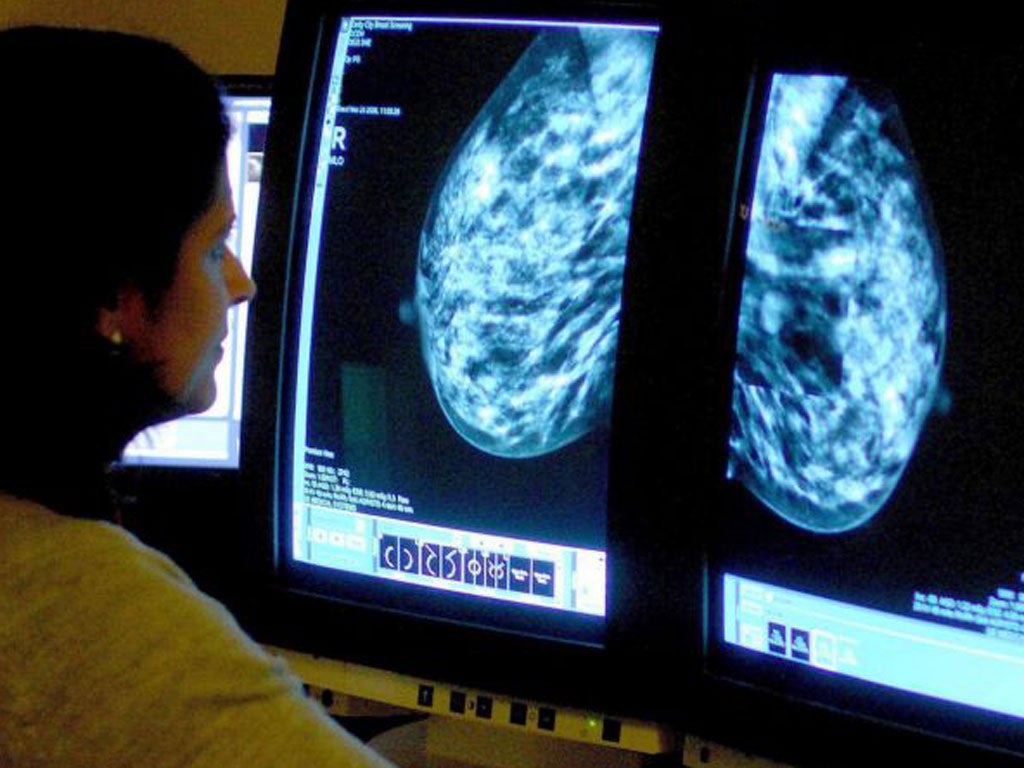4,000 cancer patients undergo unnecessary treatment as result of breast screening

Your support helps us to tell the story
From reproductive rights to climate change to Big Tech, The Independent is on the ground when the story is developing. Whether it's investigating the financials of Elon Musk's pro-Trump PAC or producing our latest documentary, 'The A Word', which shines a light on the American women fighting for reproductive rights, we know how important it is to parse out the facts from the messaging.
At such a critical moment in US history, we need reporters on the ground. Your donation allows us to keep sending journalists to speak to both sides of the story.
The Independent is trusted by Americans across the entire political spectrum. And unlike many other quality news outlets, we choose not to lock Americans out of our reporting and analysis with paywalls. We believe quality journalism should be available to everyone, paid for by those who can afford it.
Your support makes all the difference.Breast cancer screening leads to thousands of women undergoing unnecessary treatment despite saving lives, according to an independent review.
The official study found that as many as 4,000 women in Britain receive therapy for non-life threatening forms of the disease every year because of overdiagnosis. But it revealed that about 1,300 lives are saved by mammography.
The NHS Breast Cancer Screening Programme was launched in the UK in 1988 and invites all women aged between 50 and 70 to screening every three years.
There has been an ongoing debate about the benefits and harms of screening for the past 10 years, prompting the Government and charity Cancer Research UK to last year launch a review of the controversial programme.
An independent panel led by University College London's Professor Sir Michael Marmot was tasked with analysing data from screening trials from a number of countries over recent decades.
Its report, published in The Lancet, concludes that screening reduces breast cancer mortality but that some overdiagnosis occurs. It found that for every life saved, three women were overdiagnosed.
The panel said: "Since the estimates provided are from studies with many limitations and whose relevance to present-day screening programmes can be questioned, they have substantial uncertainty and should be regarded only as an approximate guide.
"If these figures are used directly, for every 10,000 UK women aged 50 years invited to screening for the next 20 years, 43 deaths from breast cancer would be prevented and 129 cases of breast cancer, invasive and non-invasive, would be overdiagnosed; that is one breast cancer death prevented for about every three overdiagnosed cases identified and treated.
"Of the roughly 307,000 women aged 50--52 years who are invited to begin screening every year, just over 1% would have an overdiagnosed cancer in the next 20 years."
The panel added: "Evidence from a focus group organised by Cancer Research UK and attended by some members of the panel showed that many women feel that accepting the offer of breast screening is worthwhile, which agrees with the results of previous similar studies.
"Information should be made available in a transparent and objective way to women invited to screening so that they can make informed decisions."
Professor Sir Mike Richards, National Cancer Director, said: "I welcome the fact that the review clearly recommends that breast screening should continue.
"But the key thing is that we communicate this new information to women so they can make an informed choice for themselves.
"NHS Cancer Screening programmes have already asked independent academics to develop new materials to give the facts in a clear, unbiased way.
"I hope to see them in use in the next few months.
"If any woman has concerns about breast screening she should talk to her GP or health professional."
Dr Harpal Kumar, chief executive of Cancer Research UK, said: "The independent review shows screening saves lives.
"Screening remains one of the best ways to spot the very early signs of breast cancer, at a stage when treatment is most likely to be successful.
"Yet, as the review shows, some cancers will be diagnosed and treated that would never have caused any harm. Clearly, everyone wants to minimise this.
"But because we can't yet tell which cancers are harmful and which are not, we cannot predict what will happen in an individual woman's case."
He added: "We think it's vitally important for women to have access to clear information about breast screening, the balance of benefits and harms and the fact that they could be diagnosed with and treated for a cancer that might not cause them harm.
"So, on balance, taking all the evidence into account, Cancer Research UK recommends that women go for breast screening when invited."
PA
Join our commenting forum
Join thought-provoking conversations, follow other Independent readers and see their replies
Comments